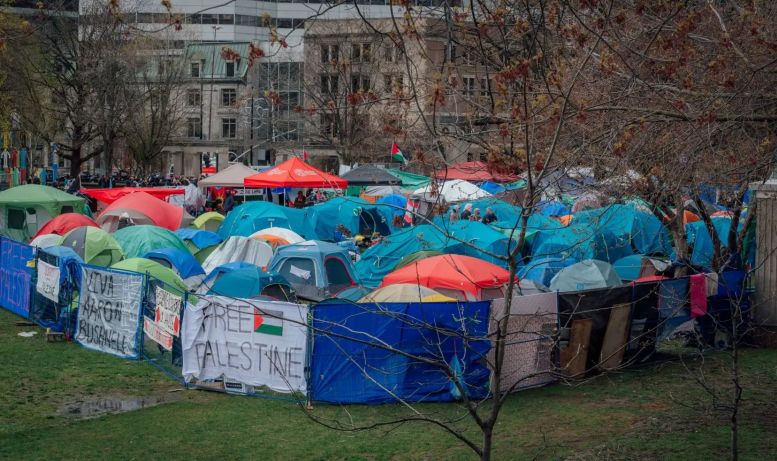The University of McGill in Montreal is in the midst of a wave of unionization and militancy not seen for over 50 years. Strikes and actions of unions and student groups have rapidly followed each other on campus over the past few months. The pro-Palestine encampment, which began on April 27, 2024, is the most recent demonstration.
The students’ actions come as part of a broader renewal of the labour struggles, with 2023 seeing the most days on strike in nearly 40 years. Québec has seen the recent certification of the union at Amazon in Laval, the strike of 5,000 workers in Québec liquor stores (SAQ), and the mass public sector strike in 2023 (the Common Front and the FAE [teachers union], but also the FIQ [nurses] and the SPGQ [professional workers], who are still negotiating). At the international level, the last few years have seen renewed struggles by workers, especially in the United States.
McGill is the richest university in Québec, the least unionized for professors, and its students are traditionally less militant. However, those last two aspects seem on course to change.
Workers’ Strikes at McGill
Until recently, the university was negotiating the renewal of its collective agreement with the McGill Graduate Student Employees’ Association (AÉÉDEM), representing mainly teaching assistants, as well as the Union of Lecturers and Instructors of McGill (SCCIM). Their collective agreements expired in July 2023 and August 2022. The negotiations concluded in April 2024 after a bitter struggle by the AÉÉDEM.
The university didn’t hesitate to utilize union-busting tactics and sent misinformation about a court decision to its own community members. McGill pressured instructors to be scabs (to do the work of the striking instructors, such as proofreading). The university also lobbied to change the format of final exams as a means to reduce the need for the instructors and as another effort to break the strike.
McGill even went as far as obtaining a court injunction that limited the number of picketers on campus after trying to claim the union had no right to picket on campus at all! The university’s request for a constant police presence on campus, without good reason, also undermined the efforts of the AÉÉDEM.
At the same time, the university faced the certification of new unions on campus, which they fought against tooth and nail. After losing the fight to contest the certification of the Law Faculty Association of McGill (AMPD), the university then went on to drag out negotiations for their first contract for over a year and a half.
This spring, the AMPD voted for three days of strike action, something never seen at McGill. They used the strike to turn up the pressure, well-aware of the anti-union tactics the university had used against the SCCIM and l’AÉÉDEM. As expected, the university didn’t hesitate to:
- cancel or shorten negotiation meetings
- refuse an accelerated meeting schedule
- fail to prepare their negotiation team, who then maliciously worked at a snail’s pace
Finally, after McGill continuously refused to negotiate in good faith, the AMPD decided to leverage their collective power and declared an unlimited strike on April 24, 2024.
New Unionization Efforts
Meanwhile, professors in the Faculty of Education intend to negotiate their first contract with McGill with their newly-formed union. Those in the Faculty of Arts filed for union certification in April 2024. Before these relatively recent initiatives, no professor or faculty lecturer at McGill had been unionized.
There is an association that pretends to represent these workers from their employers — the Association of Professors and Librarians of McGill (APBM). However, it should be noted that a previous president of this association is today the Dean of the Faculty of Sciences and a member of McGill’s administration. An organizer of the Faculty of Arts union points out that the administration may listen to the workers, but ultimately does whatever it wants anyway.
In addition to their contract struggle, the AÉÉDEM is working to unionize new categories of employees that McGill created in an effort to stop the workers from being recognized as part of one of the already existing unions. The university does this as a means to pay these new employees less. For example, test correctors are paid less than teaching assistants for similar work. Here is a non-exhaustive list of possible job titles created for just that reason: marker, teaching assistant, graduate course assistant, undergraduate course assistant, tutor, mentor, invigilator, course lecturer, faculty lecturer, and senior faculty lecturer.
Cuts at McGill
All of this has unfolded in the context of the increase of tuition fees for English-speaking students from outside Québec. Several student associations at McGill have fought against this increase by means of protest demonstrations and strike votes (including a few days of strikes by some of the smaller student associations). The response of the anglophone universities’ administrations was to take the government to court after their efforts to negotiate with the CAQ were unsuccessful.
Although these changes risk impacting university finances, the increases serve as an excuse for McGill’s administration to freeze hiring for new and replacement workers. This limits the supply of new professors, and forces those already employed to focus on teaching basic courses, limiting their availability to teach more advanced courses. Finally, the services offered to students are being undermined by the elimination of positions responsible for student residences.
Attacks Against McGill from All Sides
The university is also at odds with the Mohawk Mothers over the construction of a new building on the site of the old Royal Victoria Hospital. The hospital is built over a historic burial ground of the Mohawk people and was also the site of notorious and controversial psychiatric experiments as part of the CIA’s MKUltra program. The site was ceded to McGill by the provincial government for the starting-up of this project, without any regard for the community or other universities in Montreal.
It should also be noted that the tensions on campus have sharply increased since the attacks by Hamas against Israel on October 7, 2023, and the violent repression by Israel against Gaza. Amidst such, it seems that the university fears alienating its large Zionist donors like Sylvan Adams. As a result, McGill’s administration is alienating a large number of students and campus employees.
McGill Against Support for Palestine
Last fall, the Student Association of McGill University (AÉUM) held a referendum on a new policy against the genocide in Palestine. The policy was approved with 78 percent in favor and saw a record participation of 35 percent of the student body, despite the administration’s threat to cut all ties (including financial) with the AÉUM.
The AÉUM’s policy is currently blocked by a safeguard order from the Québec Superior Court, following a request for an injunction from an anonymous university student. This is allegedly supported by B’nai Brith Canada, an organization that defends the State of Israel and promotes Islamophobia.
The university is also putting pressure on professors to not allow students the ability to express themselves on the subject during class.
Since the fall, the student group Solidarity for Palestinian Human Rights have organized regular protests and walkouts. Despite their peaceful nature, the police have shown up at least once on horseback and another time equipped with riot gear.
An organizer of the group was reportedly arrested for using chalk paint on the university’s gate. While police were prepared to let him go if he removed all traces of chalk by the end of the day, McGill security insisted that police arrest him. McGill then shifted the blame to the AÉÉDEM, whose picket line was located at the same site.
This spring, a handful of McGill students began a hunger strike to force the administration (without success) to divest from companies that participate in the genocidal violence of the state of Israel against Palestine. Professors also organized a guided tour of campus while highlighting McGill’s complicity with Israel’s violence, for example via its links with arms manufacturers and surveillance companies.
Pro-Palestine Encampment on Campus!
Of all these actions at McGill, the one that has gained the most publicity is the erection of an encampment in support of the Palestinian cause, like those at several American universities. In just a few hours, the camp grew to around twenty tents and included a food tent and toilet. A few hundred people turned out to take part, chant slogans of solidarity, and listen to speeches. Who would have thought that we’d see an occupation of that grassy area at the entrance of the university.
One thing is certain: McGill University can no longer afford business as usual. It must now beware of the numerous unions and student groups fighting against the university’s exploitation and oppression. Alternative Socialiste (Socialist Alternative in Québec) salutes and supports these militant initiatives by groups of McGill employees and students.




